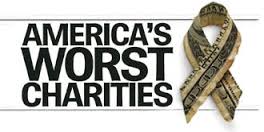
Fundraising has been in the national news quite a bit lately – and not for good reasons. If you have been following the news, you know that the Tampa Bay Times published their Top 50 Worst non-profits recently and the story seems to be gathering steam.
On top of that, you may have heard about the recent mess surrounding David Koch and WNET Public Television in New York City. Essentially, WNET aired a documentary that was none too flattering of Mr. Koch and his friends who live at 740 Park Avenue. I’ll go into more about this later.
I don’t know what it is, but every so often our industry goes through a of mess of one kind or another. Of course, what is bothersome is the fact that any bad news about a few really bad non-profits and their fundraising has an effect on all non-profits.
The other side of all this bad news is that we can learn something from this as non-profit leaders and help make our industry stronger.
The Top 50 Worst Non-Profits
First, let’s talk about the Times article. The Tampa Bay Times did a deep dive into non-profit organizations and their fundraising agencies and practices. If you view the Top 50, you’ll see something quite amazing. A majority either have the word “cancer” in them or the names of the non-profit sound a lot like reputable non-profits that ARE doing good work.
Almost all of these non-profits are connected to some kind of direct mail or telemarketing firm making a ton of money while passing a minimal amount on to anything resembling a project or program.
I applaud the Tampa Bay Times for bringing a dark subject into the light and, once again, our industry is on the defensive trying to work itself out of a corner. These are NOT real non-profits in the sense that they are actually creating any kind of worth in our society, yet they cast a dark spell over our entire industry.
I’ve talked to a few non-profit leaders who have received calls from donors wanting to make sure they were ethically sound in the fundraising practices due to this new revelation.
If you received a call tomorrow from a donor, do you know what you would say?
I hope so. You need to be prepared to answer questions about your overhead, your cost to fundraising ratio, why you spend “so much” on fundraising, etc. You have to be able to tell your donors why GuideStar gave you a two-star rating, and why that doesn’t tell the whole story. You need to be able to distinguish the business ethics of your non-profit with the Top 50 worst non-profits.
Should you have to? Probably not, but in our industry we will always be scrutinized (and this is a good thing), so you need to be prepared. If you are an MGO, you have to know how to talk about your overhead and fundraising ratios.
But there are other questions too. I mean, how do you end up leading an organization that takes 90-100% of all donated revenue and dishes it out to salary for relatives, friends and cronies?
Richard and I know. You’d have to be lost. You would have to be so far removed from your authentic self that you can’t act ethically. To be honest with you, when I read the allegations in the article, I really did a gut check on myself. Am I always truthful to my clients? Am I being honorable in my dealings at all levels with others?
If I can’t answer yes, I’m in trouble.
David Koch and WNET
Now, let’s look at David Koch and the WNET problem. WNET aired a controversial documentary regarding the wealthiest 1%. It just so happened that David Koch was featured as a big part of this documentary AND he is on the board of WNET. He also happens to be their largest donor.
This created a potential problem. You want to maintain your integrity to your mission, yet you don’t want to alienate your best donor. Quite a quandry.
The President of WNET, Neal Shapiro called up his largest donor to explain that there is a documentary that makes Mr. Koch look bad. He invited him to a round table discussion after the documentary aired, but Mr. Koch declined. Shapiro basically bent over backward to make sure that Mr. Koch had every opportunity to respond. Shapiro also demanded that they “soften” the documentary before it aired. Mr. Koch essentially said he can deal with it… but then it aired.
After it aired, Mr. Koch was so angry he resigned from the board and pulled out from any further giving. That giving equaled more than $20MM a year. WNET had also angered Mr. Koch’s neighbors. Literally. At the 740 Park Avenue address live some of the wealthiest people in America… many of whom give generously to public television.
Mr. Koch’s neighbors were quoted as being “shocked” that WNET would air such a program when they knew who their donors were.
The question to you becomes: How much should your organization be willing to either change or alter your mission for the sake of one of your best donors? And, how much power do you give your donors?
This is tough. Many folks thought Shapiro sold out WNET for kowtowing to Mr. Koch just because of his money. Others said it was a courtesy of Shapiro to warn Mr. Koch, but made the point that he did air the program, albeit slightly toned down.
Here is the question that Richard and I would ask you: What is the authentic and truthful way to handle this situation and maintain the integrity of the mission?
As a major gifts officer or non-profit leader, you may have encountered a problem similar to this. The dark side to “honoring your donor” is allowing your donor to negatively influence your mission and vision for the sake of “getting” or “keeping” the money.
Money makes us do strange things. Lots of money makes us do even stranger things. If we allow ourselves to lose our ethics, our own truth and integrity because we are either chasing or trying to keep the money… we lose.
Both of these events in our industry can teach you something. They make you ask questions that you have to know the answers to, those being: Do you know what you are as an organization? Do you know who you are as a person? Are you being authentic in your work and in your relationships with people? Are you telling the truth? Can you tell others the truth… even if it means potentially losing millions of dollars?
And the most fundamental and core question: Are you being true to yourself?
Jeff
Search Blog Posts






Jeff and Richard:
As always, you are both right on! Over the last thirty-nine years I have watched and encountered a number of non-profits who have lost their way by ignoring or forgetting about the basic principles and standards which under-gird “Philanthropy.” The quest for “money,” rather than the quest for the “common good,” pulls many no-profits into the shoals of for-profit practices. Sadly, even then their fund raising practices would not be acceptable and ethical business practices.
You are absolutely right in your invitation to all of us to do a self-check, even by inviting a trusted outsider, to see if we are true to our organization’s mission; ethical in our practices; and willing to say “no, thank you” to a wealthy donor, even if it costs us millions in dollars.
McClain
McClain, great thoughts. I like the “inviting a trusted outsider” idea. Very good thought. Thanks for writing, good insights!
Jeff